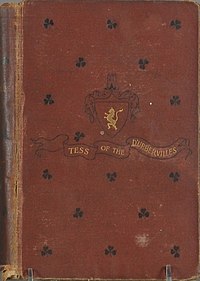Tag Archives: Thomas Hardy
Crime as Entertainment

1. Elizabeth and Tess
When Elizabeth Martha Brown took an axe to her husband on 6th July, 1856, she neither knew, nor would she have cared, that she was to play a part in the writing of one of English literature’s most important works. Nor could the young apprentice who witnessed her public hanging have guessed that the sight of it would influence a novel he was to write more than thirty years into the future.
Elizabeth claimed to have discovered her husband on the doorstep of their cottage covered with blood, groaning that ‘the horse’ had kicked him. The fact that it took her two hours to go for help was, she insisted, because he had clung to her so tightly she couldn’t get away. By the time help arrived, he was dead.
No one believed her story about the horse. The horse was still in the field, its hooves manifestly lacking any traces of blood. The gate was shut and the halter hadn’t been touched. Elizabeth had claimed too that her clothes had been covered in blood but they couldn’t be found. The axe was missing too. And to top it all, the coroner found that the wounds couldn’t have been caused by a kick from a horse.
On 21st July 1856 Elizabeth was found guilty by the jury at Dorchester Crown Court, and later confessed to the murder. She was sentenced to a public hanging. Among the spectators was the young Thomas Hardy, at that time apprenticed to a local architect. He was deeply moved by Elizabeth’s stoicism, as she walked silently to her death. There was more.
One of the hangman’s duties was to tie the dress of females, to spare their modesty. On this occasion the hangman, Calcraft, forgot. He had to climb back up afterwards to do it. The whole episode gave a sexual charge to the event. To add to the drama it was raining so that the hood that covered Elizabeth’s head clung to her face, showing her features plainly for all to see.
When he wrote Tess of the D’Urbervilles, nearly 35 years later, Hardy wasn’t telling Elizabeth’s story. The story of Tess is very different. Nevertheless Hardy has admitted that he was thinking of Elizabeth when he was writing the novel, he had in his mind those images of her public hanging, all those years ago. The sexual charge felt by the readers of Tess has its genesis there.
I am indebted to Steve Haste’s book, Criminal Sentences, for the facts in this post. It’s a wonderful full-length study of the ways in which true crime has influenced fiction, film and drama. It is well worth reading, full of fascinating information.
Crime as Entertainment was the title of my dissertation for the MA Writing at Sheffield Hallam. It’s a fascinating subject, which raises many ethical and moral questions as well as offering a wide variety of real and fictional stories. So I hope this may be just the first in an occasional series of posts on the subject.
